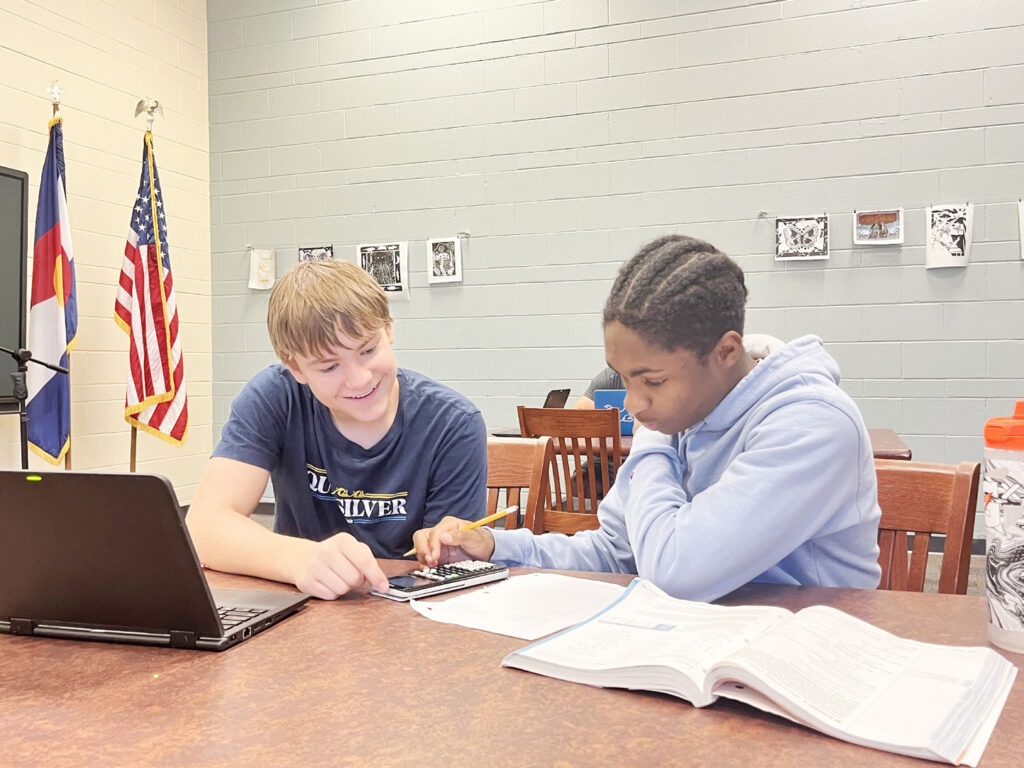The Pikes Peak Bulletin is proud to partner with the Manitou Springs High School newspaper, The Prospector, to bring you a selection of articles by student journalists. Read more at MSHSProspector.org.
MSHS adapts to the new cell phone policy
By Cordelia Portman
The question of what role technology can play in education has arisen once more at MSHS. At the start of the 2024-2025 school year, MSHS began enforcing a new school wide cell phone policy that required that phones be put away in class or advisory, and teachers are required to write referrals for any phones they see during this time.
Brooke Ferguson (grade 11) has noticed a shift in the amount of social interaction in Advisory since the start of this year. She said that many of the students in her advisory class are relatively quiet, and the cellphone policy has given students an opportunity to converse.
Ferguson has noticed a change in her relationship with technology at home since the new cell phone policy was set in place. “I have a slightly stricter relationship with technology now,” Ferguson said. “I have less investment in social media and the things that I use my phone for.”
Ferguson has found interest in other activities at home recently. “I feel like I’m more likely not to give in to the impulse to use my phone in free time and downtime,” Ferguson said. “Instead, I find myself picking up the book that I’m reading or hanging out with my family more.”
Riley Walker, an English teacher at MSHS, has noticed more social development between his students. “I’ve noticed that they are interacting more in depth, and making more eye contact,” Walker said.
Specifically in his Yearbook class, Walker feels that students have begun filling their free time with more meaningful interactions. “Between specific tasks last year and the year before, kids would be on their phones a lot,” Walker said. “Now that they’re not allowed to use their phones, I’ve printed off coloring sheets for them; and they’ll have coloring contests and hang out and speak to each other and have fun, and it’s all spontaneous to them. That has been a total change.”
Walker believes that technology including cell phones are designed to capture attention and replace the ability to problem solve, which interferes with how problem solving is taught in school. “Schools need to teach kids how to use the technologies that will help them contribute to their society and that they’ll use in the workplace,” Walker said. “But at the same time, part of school is to teach them the cognitive skills that technology supplants, like the ability to think through a problem rather than just look something up.”

Walker thinks that there are very few uses for phones as an educational tool. “I used to say in classes that the only reason the cell phone was invented was so that you could look up words that you don’t know,” Walker said. “I really think that phones are counterproductive when it comes to learning, almost in almost all cases.”
Walker feels that looking up a word is not meaningful learning, and phones don’t provide memorable lessons, compared to the repeated engagement given by a teacher. “You don’t learn something by hearing it once or seeing it once,” Walker said. “If I look something up on the internet because I’m reading a book and I just want to know what it means, it’s really just to move me through an impediment and not to learn something.”
He believes that pulling out a phone becomes muscle memory at some point because they have been allowed to fill every minute of spare time. “I know teenagers really hate to hear this, but like they’re doing it because they haven’t developed the executive functioning enough to decide against pulling out a phone because it isn’t the time,” Walker said. “They’re very much in think-do mode, and there’s no bridge between the two.”
Walker compares pulling out a cellphone without a thought to instinctively buying cigarettes. “When I used to smoke, I would drive past the 7-11 and just turn in automatically,” Walker said. “I’d be halfway up to the counter before I even realized what was happening, and that compulsive behavior with cell phones is really similar, and it’s deadly.”
Walker observes that teenagers enjoy conversing and doing new things, he advises students to explore spending time off technology. “Allow yourself to notice that you’re bored, and you want to do something else,” Walker said. “Do something outside, something with friends, something new, and you will notice that cell phones and video games and technology are just less interesting than life is.”
Student Body President Yonas Hanson (11) feels that students’ inability to be on their phones directly correlates with their productivity during Advisory. “Having access to phones always leaves an easy out of getting work done or being engaged in the classroom,” Hanson said. “So, limiting access to our phones and headphones takes away our ability to have that easy out, and I think it generally positively affects students’ work.”
Hanson feels that although technology can be a tool for students, it can also grasp their attention and take hours that they didn’t intend to lose. “Technology can be a simple one-minute distraction that leads to a full day of non-productivity,” Hanson said.
Walker feels that there’s a great deal of hypocrisy surrounding adults telling kids to avoid being on their phone, when the adults themselves have a hard time taking a break from screens all the same. “I don’t use a smartphone anymore, and not using my smartphone has drastically improved my life,” Walker said. “It drastically improved my relationship with my wife, my home life, my ability to pay attention to things and my satisfaction with my life. Of course, part of that means that I’m bored more, but making that shift makes us more fully human.”
Opinion: I’m happier without my phone
By Jon Polizzi
At the start of the 2024 school year, MSHS implemented a new school-wide cell phone policy. The policy states that cell phones and personal electronic devices must be kept out of sight during all class times. The only times these devices are allowed to be out are during passing periods or lunch time.
Cell phones have been a rising talking point for schools across the country. Most schools already had a policy that wasn’t followed, similar to the one at MSHS previously. The plea from teachers was simple: make a policy that forces students to be off their phones and engaged in class.
The new policy has most people split on one of two sides; people either enjoy the lack of phones during the academic day or they are completely against it. For me it’s the first option. The lack of use of my phone, I believe, has not only made me happier as a person, but also more focused on my schoolwork. I am not just a fluke in the system though; studies show [1] that being on your phone chronically can cause mental fatigue and cause physical problems.
Being off my phone during the school day has made me much more productive. I use school time for school, rather than pushing schoolwork off until later. The lack of screen time has also allowed me to be more involved in my relationships and after-school activities. The feeling of being forced to look at my phone for these connections was depressing for me. I wanted to slowly disconnect from my phone over the summer, and the new policy allowed me to follow through on my wishes.
Although this worked out for me, the fact that I already wanted to get off my phone made it easier. What about the kids who might have nomophobia? [2] Nomophobia is the fear of detachment from a phone. If someone has this, they can slowly start putting their phone down to get rid of the anxiety that comes from not having it. The person can also have “ringxiety [2]”, so whenever they feel like they might have a message or if they do hear one, it causes anxiety. The feeling of needing to see a phone and check it immediately is also unhealthy. Breaking these habits slowly may help a student ease off from the screen addiction.
The benefits of putting the phone down greatly outweigh the pros of using it constantly. While putting it down might be hard, these are some things to try that might help. The benefits [3] of putting your phone down include improved critical thinking, creativity and clarity. Improving your critical thinking can help in decision making and helps people make logical conclusions. By being on your phone, neural pathways that engage in complex thought processes may become less efficient without regular challenge. Your phone essentially stuffs up your brain, and it becomes harder to process information. So, putting your phone down trying a puzzle or just playing a game that tests your critical thinking is very beneficial.
If you are constantly on your phone absorbing content, your mind has no free room to focus on any creative task. The brain is so fixated on short releases of dopamine [3] that you can’t focus on a task for too long. By having your phone nearby when doing a creative task, you can also cheat it and look something up rather than coming up with it by yourself. This doesn’t mean looking at something for inspiration, but it’s more often searching something up, and copying it. To better your creative skills, try embracing the boredom you might have without your phone. Instead of filling that random gap of time with scrolling, try sitting in that boredom and thinking of something to do.

Lastly, having your phone in front of you 24/7 isn’t healthy. The clarity you have when your phone isn’t on is massive. You aren’t being bombarded by emails, texts, social media posts and YouTube notifications. When you decide to put your phone down, you’ll be able to think more clearly. The lack of messages all day helps cut out the overstimulation. This can allow you to focus all day without having distractions that force you off task.
It’s super important to look at your current situation and decide if you should start leaving your phone behind. Although I stopped using mine during the day, I still allow time at night and on the weekends. It might be hard to stop using it now but slowly getting rid of cellphone use is very healthy and beneficial.
Jon Polizzi is a senior at Manitou Springs High school. Polizzi participates in cross country, basketball and track and field for MSHS. In his free time, he likes to listen to music, and he is very passionate about Lego. He dislikes people who don’t like dinosaurs. Polizzi is excited to write sports stories and help out where it is needed.

